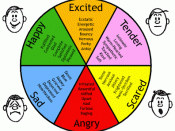In an analysis to this question we will begin by looking at, in brief, culture. Culture has been referred to as the cumulative deposit of knowledge, experience, beliefs, values, attitudes, meanings, hierarchies, religion, notions of time, roles, spatial relations, concepts of the universe, and material objects and possessions acquired by a group of people in the course of generations through individual and group striving (Samovar & Porter 1994). It has been argued that culture in its broadest sense is cultivated behavior; that is the totality of a person's learned, accumulated experience which is socially transmitted, in short, behavior through social learning.
Levy (1984) performed a study where he found that some cultures have very few words for sadness related emotions, and some of these cultures had a very rich set of terms for other emotions such as anger. He concluded that cultures may be more or less prone to perceive and talk about particular types of emotions.
Similar studies was performed in a number of non- western cultures (Lutz & White 1986, Mesquita & Frijda 1992, Russell 1991 and Shweder 1993), these studies found that there was a large diversity of emotion vocabularies and ways of talking about emotional phenomena. This led anthropologists to conclude that there is little universality of emotion. In fact, according to this view, emotions are mainly determined by culture specific values and modes of interaction. We may argue that this anthropological evidence as well as indications of historical changes in emotion concepts have served as basis for the claim that emotions are a social construction. The social psychologists that propose this view (Harre 1986, Oatley 1993, and Averill 1980) presume that emotions have no reality other than that which is culturally created, or socially constructed.
We may argue that frustration, anger, aggressive cues and experience...


